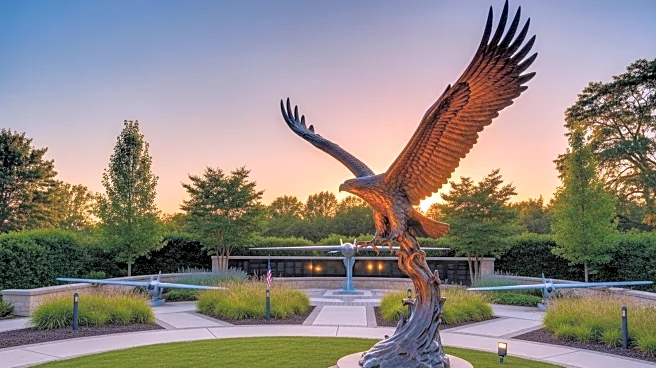What is the story about?
What's Happening?
A memorial service was held to honor Major Glenn Hagenbuch, an American pilot who died in an air crash 82 years ago near Whipsnade in Bedfordshire, UK. Major Hagenbuch had completed 25 missions against Nazi Germany during World War Two and was training other US pilots in the UK when his plane crashed. For many years, his family was unaware of the exact crash site until a chance encounter with a zookeeper confirmed the location. The memorial service was organized by Whipsnade Parish Council, and attended by Major Hagenbuch's relatives, including his nephew David Hagenbuch, who expressed gratitude for the closure provided by the event.
Why It's Important?
The memorial service for Major Hagenbuch highlights the enduring impact of World War Two on families and communities, bridging historical gaps and providing closure to relatives of those who served. It underscores the importance of preserving historical sites and memories associated with wartime events, fostering international camaraderie and respect. The event also reflects the collaborative efforts between local communities and families to honor the sacrifices made by servicemen, contributing to a broader understanding of historical narratives and their significance in contemporary society.
What's Next?
The memorial service may inspire further efforts to locate and commemorate other historical sites related to wartime events, encouraging communities to engage in preserving history. It could lead to increased interest in historical research and documentation, potentially involving local councils and historical societies. The event might also prompt discussions on how best to honor and remember those who served in past conflicts, influencing future memorial practices and educational initiatives.
Beyond the Headlines
The memorial service for Major Hagenbuch not only provides closure for his family but also serves as a reminder of the personal stories behind historical events. It highlights the emotional and cultural significance of wartime memories, encouraging reflection on the human aspects of history. The event may also contribute to discussions on the ethical responsibilities of preserving historical sites and narratives, ensuring that future generations understand the complexities and sacrifices associated with war.
















